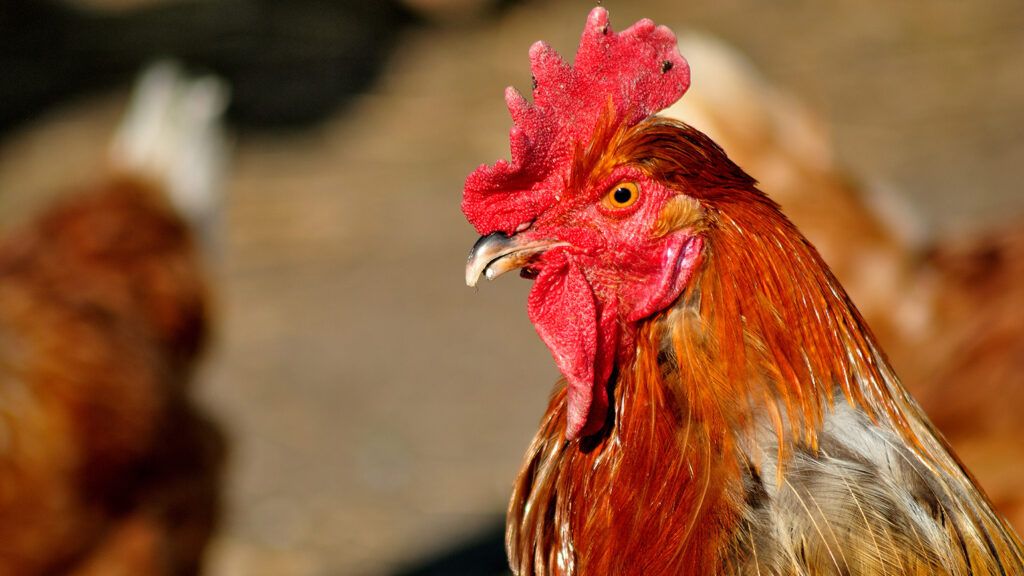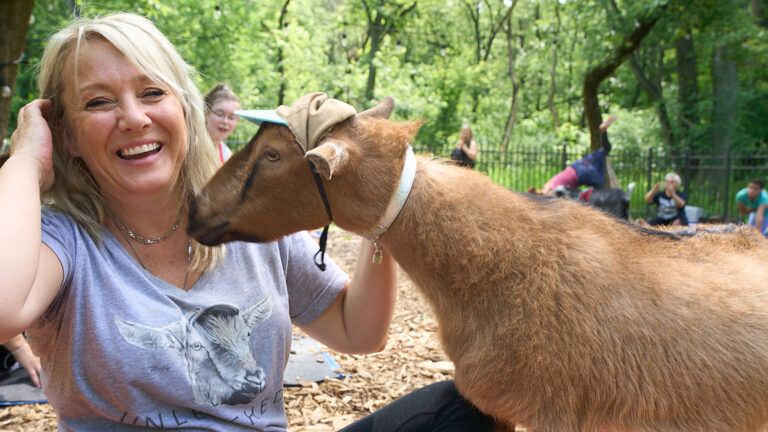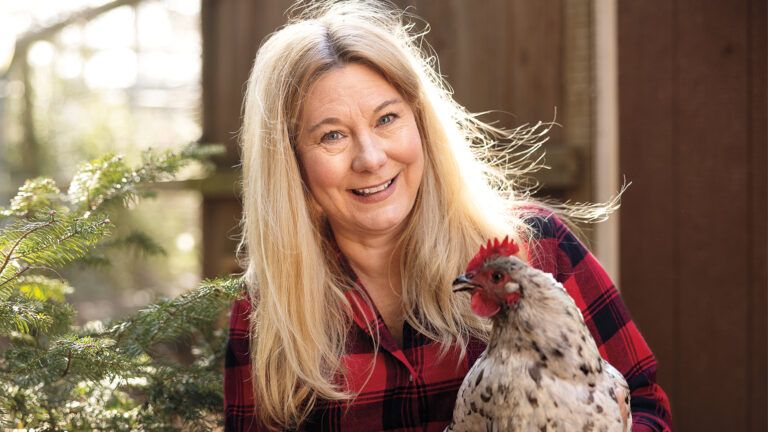For two years, I’d wanted to raise chickens. I read books about them. I did research on the internet. I pored longingly over Pinterest pictures. I prayed to have my own flock one day.
When Jacob and I married and settled into our new home in the country, I was ready to finally become a “chicken lady.” The problem was, we didn’t have chicken accommodations and it was too close to winter. All my research told me that winter was not the time to buy chicks.
That didn’t stop me from dreaming. And dropping hints about what I wanted for my birthday, in November. “First things first,” Jacob patiently reminded me. “Wait for spring chickens.”
I was determined. I took my case to the Lord again. Only this time I not only asked him for chickens, but I also specified the number and breed—eight Rhode Island Reds—that I wanted for our beginner farm.
A few days later we stopped by the feedstore to pick up dog food for our Great Dane, Max. I walked in and heard a peeping sound, which drew me like a magnet to the back of the store. There I found a cardboard box dotted with airholes. I looked inside and instantly fell in love: wiggly, cheeping yellow fluff balls—baby chicks!
The store clerk told us that this was their last batch of chicks. They were on sale and we could have them at an even better price if we bought them now. “Please, Jacob? It’s almost my birthday,” I said. “And these are the exact breed and number I prayed for!”
Jacob agreed. After all, how could he argue about an already boxed birthday gift and an answered prayer? We left the store carrying the box of chicks.
“You realize that we have nothing prepared to raise this little brood, right?” Jacob said on the drive home. I thought quickly and answered, “We’ve got that empty guinea pig cage. We can keep them there for the time being.”
That night the chicks slept cozily in the cage, which we set up in the guest bathroom. It turned into an extended stay. My peeps were so little and it was an unusually cold winter. Plus, I was having trouble finding just the right house for them. My brood stayed in that bathroom for three months, moving from the guinea pig cage to Max’s huge crate as they grew.
It seemed as if I was constantly feeding and cleaning up after them. Still, I loved my noisy little flock. I was officially a chicken lady now! When I let the chicks out of the crate to scamper around the bathroom floor, our cat, Bolt, would pat each one on the head as if keeping count. “Bolt is just checking the menu,” Jacob would tease.
One especially friendly chick stole my heart. Every time I called “chick, chick,” she was the first in line, even scrambling up onto my lap. Jacob thought the chick was just afraid of Bolt, but I was convinced she’d bonded with me.
In late winter Jacob found the perfect house for our growing young ladies—a child’s play house, sparkling white with bright red shutters and trim. He drove six hours roundtrip to pick it up, and he modified it for the girls. He was thrilled that our noisy, messy houseguests finally had a home of their own.
Even after the move outdoors, they continued to follow me everywhere, and the friendliest chick still hopped onto my lap every time I sat on the grass near their coop. One morning while petting her head, I felt a telltale growth. Our little pullet was in fact a rooster! I named him Abraham, hoping he would live up to his biblical namesake and father a brood “as numerous as the stars in the sky and as the sand on the seashore.”
Abraham was four to five months old when he began finding his voice—weak, broken crows that sounded like the squeaks of a teenage boy. That didn’t stop him from throwing his head back and crowing early each morning. After his song got the ladies’ attention, he would strut around to impress his admiring flock.
Even though Abraham was growing into his duties as yard master, I found out from my mom that he hadn’t forgotten his easy-living days as a houseguest.
Mom lives next door. On pretty days, she’d crack open her porch window so her cat could come in and out. It never crossed her mind that her porch window resembled the window that Abraham used to enter the henhouse. One afternoon while she was resting in the living room with her feet up on the ottoman, she opened her eyes to see him squeeze through the porch window, walk into the living room, jump up on the ottoman and perch by her feet. She didn’t know how Abraham would react if she reacted, so she sat very still. She did manage to snap a picture with her phone before he hopped down and left the same way he came in.
One day she came home to find the cat outside and Abraham inside, feasting at the cat’s bowl. The following day Mom had Dad install a rooster-proof cat door, and she permanently closed the porch window. That was the end of Abraham’s forays next door.
By summer we’d added to our flock and were enjoying an abundance of fresh eggs—enough for ourselves, family and friends. Our chickens and rooster provided as many entertaining moments as eggs.
Abraham was in his prime, strutting around the yard, head high, chest out, bossing his ladies. He took good care of them too, even leading them to the biggest, most perfectly ripened tomatoes in my garden. He seemed to know the exact moment the tomatoes reached their peak. That’s when he and his ladies would launch a raid. All I managed to salvage from the garden were jalapeño peppers. He was too smart to bite the one vegetable that bit back.
Abraham had a temper as fiery as those jalapeños when it came to protecting his flock. Our neighbor’s pit bull puppy, Tank, was sweet and gentle, yet his every attempt to make friends with the chickens failed. As soon as Abraham spotted him, he would jump on the pup’s back, flog him with his wings and ride him like a rodeo star all the way to the edge of the yard. He was doing what good roosters do.
Some of his ways surprised us, though, especially his compassion for and commitment to one particular hen. She had a crooked foot, and the other chickens constantly pecked at her. That’s how a flock works out its social hierarchy, or pecking order. Bigger, stronger chickens peck the others into submission. A chicken gets access to food, water and nesting spots based on its rank.
Abraham seemed to sense this hen’s disability. He intervened and defended her from her tormentors. Even more amazing, he teamed up with her. They became the alpha pair—Abraham, a big shiny Rhode Island Red with blue plumed tail feathers, and Crooked Foot, a plump bossy black-and-white Barred Rock hen. They were devoted to each other, and together they ruled the roost.
At maturity Abraham had a fullbodied crow and was true to his namesake. He and his ladies produced the large, healthy flock I had prayed for. I was so happy to be living my dream of being a chicken lady.
Coming home from work one day, I turned off the highway onto our two-lane road. In the distance I could see a man standing in our driveway. Something was wrong, I could just tell.
I pulled into the driveway and recognized the man as our neighbor Mr. Proctor. He was visibly shaken. “Lacy, two stray dogs attacked the chickens.”
I ran to the backyard. All I could see were feathers and blood and dead chickens. I walked to the torn chicken wire that surrounded their pen and coop. There in the opening lay the broken body of my beloved Abraham. I looked inside the chicken house, its white paint now splattered with blood. Through my tears I saw Crooked Foot, huddled on her nest, fearfully brooding over her two remaining eggs. The only survivors.
Shaking from shock and loss, I scooped Abraham’s limp body into my arms and held him. Mr. Proctor quietly filled in the details.
He’d been working near his barn when he heard loud barking and shrieking. He crossed the fence between our farms just in time to see the end of the massacre. Abraham had fearlessly jumped on the strays, flogging and spurring them, but even my big brave rooster was no match for two large dogs. It was Max, our Great Dane, and Tank, another neighbor’s pit bull, who fought and chased off the strays as Abraham lay dying and Crooked Foot hid on her nest.
That night, after cleaning up the carnage, we buried Abraham under my favorite oak tree. Jacob made a mosaic-encrusted plaque with “ABRAHAM” carved in the middle.
Whenever I see Abraham’s marker, I’m reminded of the life lessons he taught me:
- Start the day with a joyful noise.
- Strut your stuff.
- Tomatoes taste best straight from the garden.
- Love without boundaries.
- Defend the weak.
- Explore new frontiers.
- Stand strong in the face of adversity.
Even though we’ve replenished our flock, we will never be able to replace Abraham. He did leave a legacy, however. Of the two surviving eggs that his partner Crooked Foot hatched, one turned out to be a little rooster. He looks nothing like his father, but his personality is exactly the same. He comes running when I call him, and he climbs onto my lap every time he sees me sit on the grass. I named him Lincoln.
For more inspiring animal stories, subscribe to All Creatures magazine.






